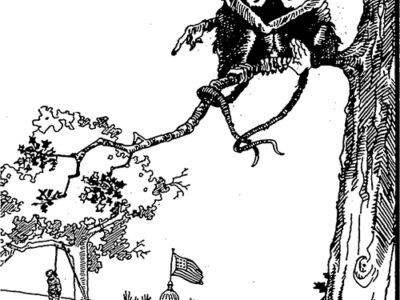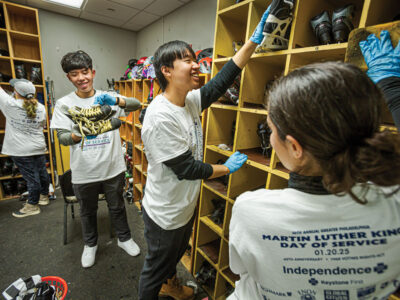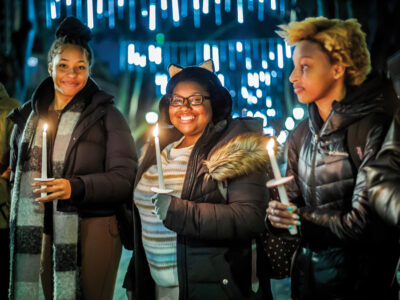A rabbi, an actor, and a testament to the importance of Black–Jewish solidarity.
David Wolpe C’81 didn’t quite believe it at first when he got a phone call and the person on the other end of the line said, “Hi, this is Van Jones.” Wolpe—a prominent rabbi who was once named one of the world’s most influential Jews [“The Many Songs of David,” Sep|Oct 2015]—was even more gobsmacked at why the well-known CNN political commentator was calling him.
In the wake of Hamas’s October 7 attacks on Israel, “he said, ‘I want to put together a service for Blacks and Jews because we want to pray for you,’” recounted Wolpe at Houston Hall in late January. Wolpe returned to his alma mater to speak with actor and Jewish advocate Jonah Platt C’08 in a conversation that highlighted Penn’s annual Interfaith Commemoration of the Life of The Rev. Dr. Martin Luther King Jr. and focused on allyship between the Black and Jewish communities.
Wolpe told the audience that he and Jones ended up working together to organize a service that featured about 100 people, including the prominent Black preacher T. D. Jakes, who prayed for the Jewish community. Before that, “I don’t think that I’ve ever had tears in my eyes at someone else’s prayer for me in my life,” Wolpe said. “It was so meaningful and so powerful.”
Echoing Wolpe’s sentiment, Platt noted that “this has been such a harrowing and trying time” for Jews and that “any support feels so good and nourishing—but especially the support and allyship of non-Jewish people and especially from the Black community, with whom I feel such a kinship. It means so much, every word of support. It’s like balm for the soul.”
The keynote discussion between Wolpe and Platt was moderated by William Gipson, the University’s special advisor to the vice president for social equity & community who started the MLK Interfaith Commemoration when he served as Penn’s chaplain 28 years ago. The event also featured performances from student musical groups West African Vibe, Off the Beat (the a cappella group Platt sang in when he was a student), and the Shabbatones; the presentation of community involvement awards; and remarks from Penn Interim President J. Larry Jameson and Chaz Howard C’00, the University’s chaplain and vice president for social equity & community.
In front of a background photo depicting King with Rabbi Abraham Joshua Heschel, Jameson called “allyship” an important part of King’s legacy during the civil rights movement, noting that Heschel, a leading Jewish philosopher of the 20th century, marched with MLK from Selma to Montgomery, Alabama, in 1965. “Now it’s time for allyship again,” Jameson said. “We serve a common purpose and the weight of addressing antisemitism shouldn’t fall entirely on the shoulders of the Jewish people.”
In his remarks, Howard pointed to the lives and friendship of King and Heschel as an example of “courage and love in the face of fear and hate.” Those are attributes, Howard added, that Wolpe and Platt share as they try to counter antisemitic views by speaking truth without “a hardened heart.”
Platt—whose parents, the award-winning film and theater producer Marc Platt C’79 and Penn Trustees Vice Chair Julie Beren Platt C’79, knew Wolpe in college—has been active on social media, posting videos to Instagram to explain common misconceptions about the Jewish people and Israel. “I try to reach the people who I feel are reachable,” he said. “That’s who I am looking to educate, because I know there are many well-meaning, goodhearted, intelligent people out there who simply don’t know what they don’t know.”
Given the fact that there are only about 15 million Jews in the world—“Kim Kardashian has 24 times more Instagram followers”—Platt is trying to ensure that “with all of the noise out there, that you’re actually listening to the experience of the Jewish people from Jews” and also that Jews are included in conversations on inclusion and equity.
“So much of how hate is allowed to grow and fester is well-meaning people who stay quiet,” said Platt, adding that he admired how King faced those who hated him with dignity and self-respect. “They may not be the ones introducing the hate, but they’re not stopping it either.”
Platt noted that he’s currently involved in his own acts of allyship, including work with a group called the Inheritance Theater Project, which is planning a Juneteenth Passover seder performance in Los Angeles. “The kinship of our communities is so important to me,” Platt said. “I’m very excited and hopeful for what’s on the horizon.”
Wolpe acknowledged that there are “real tensions” between the Black and Jewish communities in the US, including disagreements over Israel and Gaza. It would be silly to hide them or pretend they don’t exist, Wolpe said, but it’s imperative to not “make them irrevocable.” Solidarity between the two groups, who have both suffered through hardship and oppression, has generally risen above tension, because “most of the time,” Wolpe said, “the people who hate, hate minorities of all kinds.” That allyship has stretched throughout much of the country’s history, from the important role Jews played during the civil rights movement to the summer of racial unrest in 2020, when Wolpe’s Los Angeles synagogue hung a banner that read, “We stand with our African American brothers and sisters against racism.”
“Anybody can bless anybody,” Wolpe said. “It doesn’t matter if you have political disagreements. You can learn and you can bless. And you can strengthen others who feel scared.” —DZ




